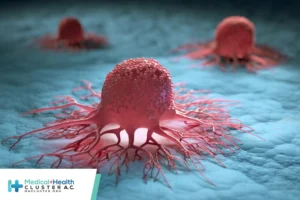Tras haber chocado su bicicleta contra una barrera, Katie Zaferes...
Leer más
Dampening Immune Response May Resolve Post-COVID Breathlessness

Persistent breathlessness is reported by more than 50% of patients recovering from COVID-19. Now researchers have suggested that this may be due to long-lasting immune activity in the airways, raising the possibility of finding ways to overcome the problem.
In their study, published in Immunity, researchers from Imperial College London’s National Heart and Lung Institute (NHL) looked directly at which immune cells are active in the lungs following COVID-19 infection. They found that COVID-19 causes a prolonged change to the airway immune landscape in those with persistent lung disease.
For their research they studied 38 post-COVID-19 infection patients undergoing bronchoscopy 3-6 months after they left hospital for the investigation of persistent respiratory abnormalities. They compared this group with 29 healthy volunteers who had no underlying diseases and who had not had COVID-19, assessing lung CT scans and lung function, and analysing lung fluid samples and blood samples.
Persistent Immune Response in Lungs
The authors said that at 3-6 months after infection, there was no difference in the immune cells seen in the blood of the post-COVID-19 and the healthy participants. However, there were more immune cells in the lungs of the post-COVID-19 participants than in the healthy controls.
Joint lead author, Dr James Harker, from the NHL, said: “Our study found that many months after SARS-CoV-2 infection, there were still abnormal immune cells in the airways of patients with persistent breathlessness. We also identified a protein ‘signature’ in the lungs indicating ongoing injury to the airways.”
All post-COVID-19 patients tended to have higher levels of immune cells linked to cell death, epithelial damage and tissue repair, the authors said, adding that there also appeared to be distinct roles for the different immune cells in the lungs. For example, higher numbers of cytotoxic T cells led to damage to the lung tissue and greater airway dysfunction, while having more B cells was associated with greater signs of lung abnormalities on CT scans, such as scarring and physical changes in the lung tissue.
Joint senior author, Professor Pallav Shah, also from the NHL, said: “These findings suggest that persistent breathlessness in our group of COVID-19 patients is being caused by failure to turn off the immune response, which leads to airway inflammation and injury.”
Possible Improvement Over Time
Co-author, Dr Bavithra Vijayakumar, from the NHL, explained that other research has found that the immediate response to COVID-19 involves an uptick in various types of immune cells in the blood and in the lungs to fight the virus. “For severe infections, like those seen in our study participants, there also tends to be heightened signs of inflammation,” he said. “However, after 3-6 months, it appears that these signs in the blood return to normal, while those in the lungs take longer to resolve.”
The researchers also investigated whether symptoms and lung immune system findings improved over time by re-assessing 17 of the post-COVID-19 participants a year after they had left hospital. They found that by then, 14 participants had improvements in their symptoms and fewer lung abnormalities on CT scans. The other three participants still showed lung abnormalities on CT scans, however, there was a reduction in the numbers of immune cells present in their airways compared with earlier assessments. This suggests that these immune responses may improve over time, said the researchers.
Dr Vijayakumar said: “Our finding that the immune response in the blood doesn’t appear to match that of the lungs emphasises the importance of assessing airway immunity in order to better understand persistent respiratory symptoms post COVID-19.”
Dampening Down Immune System May Help
The authors note some limitations of their study, pointing out that participants had severe COVID-19 disease requiring hospitalisation and ongoing monitoring, meaning it was unclear if their results would apply to people with less severe disease. They also explained how they were only able to study the participants’ lungs after COVID-19, so couldn’t rule out if signs they discovered were present before infection.
While their findings needed to be confirmed by a larger study, the researchers said that recovery from COVID-19 might be accelerated by treatments to dampen the immune system and reduce inflammation.
Professor Shah said: “The next steps of our research will be to see if there are treatments that can reduce the immune activity and whether they help to reduce the persistent breathlessness some patients experience.”
Créditos: Comité científico Covid




